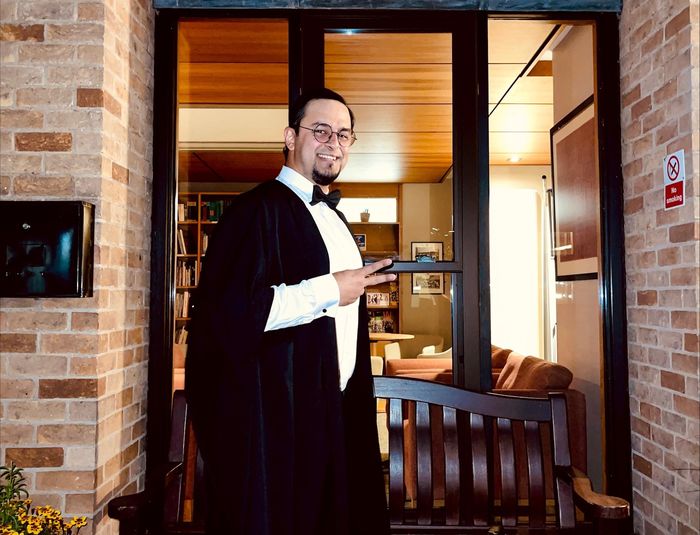Former Shadow Chancellor expresses ‘grave concern’ following ‘state-sponsored threats’
John McDonnell addressed the Vice-Chancellor and Wolfson College President, expressing ‘grave concern’ about the University’s response to threats against Roshaan Khattak

Former Shadow Chancellor John McDonnell has urged Cambridge University to “support” postgraduate student Roshaan Khattak, amid claims that his research is being obstructed following alleged threats from the Pakistani state.
In an email sent to Wolfson College President Ijeoma Uchegbu, which also addressed Vice-Chancellor Deborah Prentice (10/04), McDonnell expressed “grave concern” about the University’s response to threats against Khattak, whose research focuses on alleged human rights abuses in Balochistan, a conflict-ridden region of Pakistan.
“I urge both the College and the University to ensure all necessary security precautions are taken to safeguard Mr Khattak and support his ongoing research,” the MP for Hayes and Harlington wrote. He warned that any curtailing of the student’s research or “yielding to intimidation” would embolden those behind the threats.
This comes after Varsity reported that Khattak received a threatening message on X in December.
The message warned: “Don’t forget even Cambridge and [the] UK is not safe. For them they can get anywhere… Don’t be stupid.” Police subsequently informed Khattak that the perceived threat did not meet the threshold for a criminal offence under malicious communications laws.
Khattak said he believed that this message was sent by an agent of the Pakistani Inter-Services Intelligence (ISI).
This threat came days after Khattak had arranged an online solidarity conference over the “enforced disappearance” of his cousin, Idris Khattak, in Pakistan in November and also in the same month he was asked to draft a bill in the UK Parliament on transnational repression by both Jeremy Corbyn and John McDonnell.
A spokesperson for Wolfson stated at the time: “The College is and has been taking all steps toward resolving the situation, including ongoing conversation with the student.”McDonnell’s recent email stated: “In recent years I have taken an interest in the human rights abuses taking place in Balochistan, including incidents of transnational repression… Recent social media posts and news articles indicate that Mr. Khattak received threats in December last year and I am concerned that it appears he has not been afforded adequate security measures since then. This is especially alarming given that multiple human rights defenders, lawyers and experts have already raised serious concerns with the college.
“Moreover, Mr. Khattak feels his… research is being hindered as a result. My fear is that any curtailing of Mr. Khattak’s research or yielding to intimidation would not only threatens academic freedom but may also embolden those behind these threats, potentially leading to more severe attacks or oppressive measures in the future against the student and his family.
“I am certain that, given its reputation and history, Cambridge is well equipped to protect vulnerable students and uphold the principles of academic freedom. It is vitally important that his research into the critical issue of the Balochistan genocide must not be obstructed, regardless of any pressure from the Pakistani state.
“Many observers consider that his work could contribute substantially to reducing the incidence of genocidal crimes in Balochistan, underscoring the gravity of this issue for those seeking peace in the region. I therefore urge both the College and the University to ensure all necessary security precautions are taken to safeguard Mr. Khattak and support his ongoing research,” McDonnell continued.
Several organisations, academics, and campaigners have also written to the University seeking greater protection for Khattak.
Campaigner Peter Tatchell posted on X that he was “deeply concerned by reports that some people at Cambridge Uni are allegedly trying to block” Khattak’s PhD. “Whether it’s negligence or bowing to Pakistani military pressure, academic freedom is at risk. I urge the university to protect the researcher & allow his PhD to continue.”
Human rights lawyer Clive Stafford Smith OBE stated: “I am confident that his [Khattak’s] work will be so impactful that it holds the potential to contribute meaningfully to the reduction of crimes against humanity during the ongoing genocide in Balochistan.”
Mary Lawlor, the United Nations Special Rapporteur on the situation of human rights defenders, posted in February: “Hearing disturbing news that human rights defender Roshaan Khattak, a PhD student at Cambridge University, has received online threats pressuring him to cease documenting human rights abuses against Pakistani activists including his cousin HRD Idris Khattak.”
The Cambridge University Amnesty International Society stated: “Recent communications suggest that he is being told that he can’t continue for his research… We are especially concerned that these constraints may be the result of external pressure – potentially from the Pakistani government – combined with internal vindictiveness in response to Roshaan’s public requests for greater security.
“If his scholarly inquiry can be halted or stifled, then crucial research – on race, empire, populism, climate change, or any number of pressing social issues – may also be endangered in the future,” they added.
Wolfson College was contacted for comment.
 Comment / Lectures are optional so give us the recordings14 May 2025
Comment / Lectures are optional so give us the recordings14 May 2025 News / Uni unveils new Physics faculty building 13 May 2025
News / Uni unveils new Physics faculty building 13 May 2025 Theatre / Britain’s dying Oxbridge play: should we still be staging Bennett?14 May 2025
Theatre / Britain’s dying Oxbridge play: should we still be staging Bennett?14 May 2025 Features / Is the condom becoming counterculture?13 May 2025
Features / Is the condom becoming counterculture?13 May 2025 Lifestyle / The woes of intercollegiate friendships8 May 2025
Lifestyle / The woes of intercollegiate friendships8 May 2025






